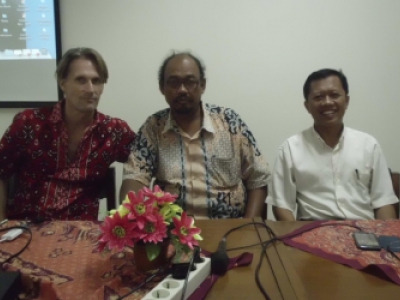A GUEST LECTURING PROGRAM IN LANGUAGE, ORAL TRADITION, AND ETHNOBIOLOGY

Indonesia is rich in cultures and knowledge. A country which is ethnically diverse, Indonesia has an official language spoken that is Bahasa Indonesia or Indonesian Language. Though Bahasa Indonesia, is widely spoken throughout the nation, each ethnical group has their own language. This phenomenon interests many language researchers to examine those languages. One of those researchers is a Swedish researcher named Steven Danerek. He presented his paper in front of students of Javanese Language Education Department, Faculty of Languages and Arts (10/1/2014).
The lecture was given at the Educational Development and Quality Assurance Building. In his presentation, he presented his research findings of the study of the culture and language of Palu’e people in Flores, Nusa Tenggara Timur, Indonesia. He chose Flores as his research location since he was looking for a language for which no dictionary has not been produced.
“I decided to research a language which is spoken by fewer people but rich in terms of culture. In Flores, 150 people speak this particular language. If other researchers conduct their research in Indonesia, they will probably choose Java. That is why I preferred another location outside Java,” he explained.
“The research was conducted in 2013 from January to March. February was the toughest month because the region was in fog, a lot of animals dead and people got sick, “ he discussed further about his research findings. His documentations about the activities of Palu’e people amazed the students.
Dr. Suwardi, M.Hum., the head of the Javanese Language Education Department was also present in this program. "We see that a great opportunity for collaboration in ethnic language research is widely open for our teaching staff, "he said.
The buffalo slaughter tradition is also one of Palu’e people traditions which keeps his amazement. It symbolizes the act to purify the land and Palu’e people gratitude to God. The slaughter ceremony includes a dance which lasts for two hours. After the ceremony ends, the five year cycle to breed a calf starts and the Palu'e people are prohibited to slaughter buffaloes during that period. In their belief, a lot of activities which are considered as taboos are subject to be avoided. (Yuliana)

